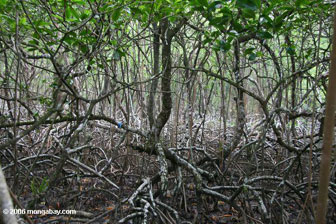Ecosystems are capital assets argues report
Ecosystems are capital assets argues report
mongabay.com
May 7, 2007
Global ecosystems should be treated as capital assets argues a new report released today by the World Resources Institute (WRI).
“We must urgently expand the climate debate beyond reducing greenhouse gases to focus on how climate change is altering ecosystem services,” said Jonathan Lash, president of the World Resources Institute. “Lima in Peru, for example, is entirely dependent on water from glacial melt. The glaciers will be gone in 20 years. Their options range from energy intensive desalination to a pipeline to the Amazon River – also threatened by climate change. Such decisions have huge implications for people and ecosystems.”
The new WRI report examines trends revealed in the 2005 Millennium Ecosystem Assessment (MA) by the U.N. and puts forth an agenda for business, governments, and civil society to reverse ecosystem degradation.
Speaking at a WRI news conference, Achim Steiner, executive director of the United Nations Environment Programme, said that Millennium Ecosystem Assessment showed both the values of services provided by nature and the current plight of the world’s ecosystems.
 Mangrove forest in Panama |
“The MA put the plight of the planet’s ecosystems firmly on the world’s radar – 15 of the 24 ecosystem services are being degraded or used unsustainably. It also gave the world a glimpse into the economic costs accruing from over-extracting this nature-based or natural capital,” said Achim Steiner, executive director of the United Nations Environment Programme.
“But there is also cause for optimism. The Intergovernmental Panel on Climate Change has concluded that the costs of acting to decarbonize our economies will be far less — some 3 percent of global GDP, and less if wider benefits are factored in — than the costs of inaction. If the world can act on climate change, it can act on the equally important issue of ecosystems. We have enough knowledge, market mechanisms, and creative fiscal incentives to make a start. We now need the courage and intelligence to act.”
The WRI report’s authors, Frances Irwin and Janet Ranganathan, say that when accounted for, the value of nature’s services can help guide sustainable policymaking decisions.
“Nature’s benefits – both economic and social – could sustain many generations to come if businesses, governments, and civil society pursue the action agenda, which calls for an increase in the availability of information on ecosystem services and a redressing of the balance in favor of local rights to resources and local voices in decision making,” states WRI in a release.
“The way forward requires rewiring the institutions of governance – making new connections to understand and find solutions to solve the complex interlinked challenges of ecosystem degradation,” said Ranganathan. “One thing is abundantly clear: ‘business as usual’ is no longer an option. The time has come to stop operating Planet Earth Ltd. solely for the purpose of making a few shareholders rich in the short term, and instead manage it as a family trust fund, set up for the benefit of today’s and tomorrow’s children.”
The report:
Restoring Nature’s Capital:
An Action Agenda to Sustain Ecosystem Services
This article is based on a WRI news release